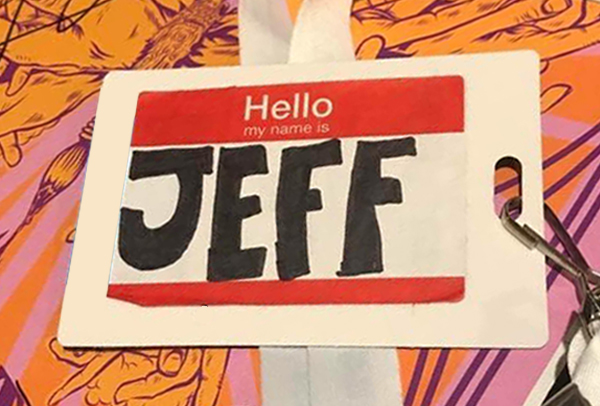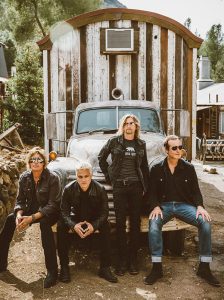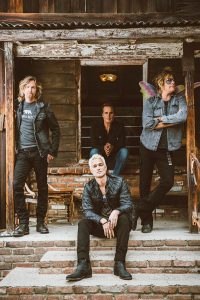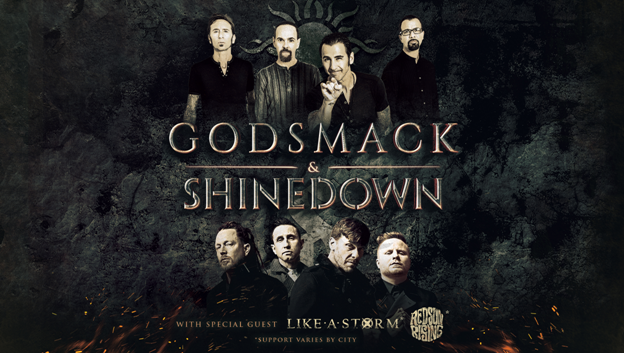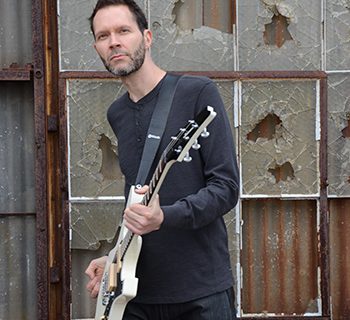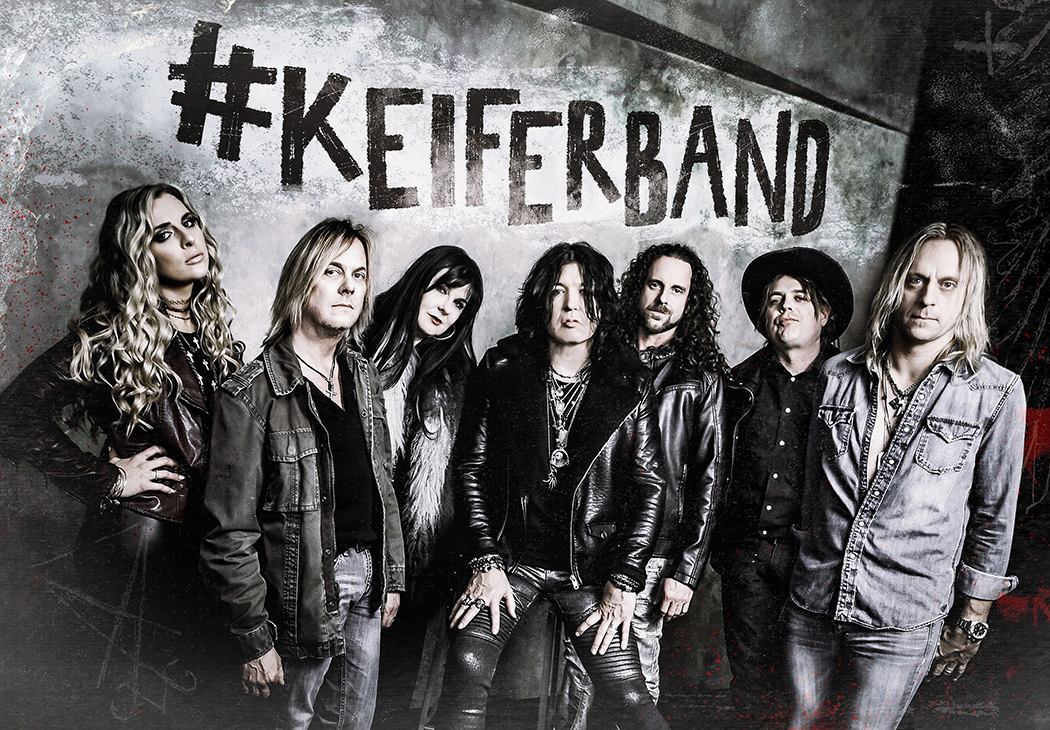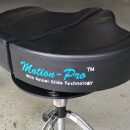It takes more than sheer skill to fill the shoes of a legend. But when Jeff Gutt assumed the role of a singer he had grown up inspired by, he not only filled a void, but seems to have propelled the band to new levels of creative output.
It took him virtually no time at all to lock into the band’s formula. Gutt has the range, the tone, and the fuck-you-flare that has been at the heart of the Stone Temple Pilots signature sound for decades, and he delivers their vast catalog without stepping on the legacy that is Scott Wieland or Chester Benington. Quite the magic trick; to blend-in seamlessly while setting yourself apart.
And this was a priority for Jeff: To see the Stone Temple Pilots’ classics presented with respect for the members still here and the ones that are not, and to celebrate and continue the musical journey of Stone Temple Pilots with the new music.
"Scott paved quite a way,” Guitarist Dean DeLeo told MusicPlayers.com at the Adopt The Arts Benefit in Hollywood this past January. “Not just anybody can sing this catalog. And Jeff kind of has it all, man.”
While Jeff has proven more than capable of tackling the classic material, what is also clear is that he was not brought onboard solely to lead a trip down memory lane. In fact, by the time STP welcomed Gutt, the band was already several songs deep into new material. And as much as they wanted to find a singer, they also wanted a collaborator.
And the chemistry proved positive from day one. Jeff merged from the left, crafting melodies and writing lyrics for tracks the band had finished, and collaborating with them on new music. The result? 14 songs—the most for any record in STP history.
RELATED: Stone Temple Pilots (2018) Album Review
For the founding members, the road to this moment has been a long one, filled with unimaginable triumph and tragedy. Their debut, Core, remains one of the staples of early-Nineties alt rock and grunge, and their 1994 follow-up, Purple, debuted at Number One and moved six million units. Stone Temple Pilots remains one of the best-selling bands of the 1990s, with Platinum records and a Grammy to their credit—all while the ever-so-common, dysfunctional family, band dynamic reared its ugly head. Scott Weiland grappled with ongoing drug addiction that led to arrests and extended hiatuses.
After splitting with the singer for good in 2013, they regrouped with Chester Bennington (of Linkin Park fame). Then, in December of 2015, Weiland, still estranged from his former band, was found dead on his tour bus from an accidental drug overdose. By that time, Bennington had amicably parted ways with STP in order to focus on Linkin Park. In July of 2017, the 41-year-old Bennington took his own life at his California home.
It was clear when speaking with the DeLeo brothers that, while they might still be raw regarding their losses, hope remains for a successful future for Stone Temple Pilots. They are full of gratitude for all they have endured and all they’ve been through.
“We are thrilled about what lies ahead,” says Dean DeLeo. “The best way for us to honor our past is to keep making new music, and when you start in a place of gratitude, you can go anywhere.”
Robert adds, “So much has happened over the past 25 years, and the past two years have been very— regretfully—eventful. There’s a lot of life that’s been funneled into this record. (But) we still have the love, and drive, and motivation to make records. And this new start with Jeff is something we’re really grateful for, and I think what this new record shows is resilience. Resilience and gratitude.”
Having heard the fantastic new album, and having heard equally strong, live STP performances featuring Jeff Gutt at the wheel, we just had to learn more about the man and his essential role with this essential rock band. We spoke with Jeff to get some answers.
MPc: Your vocals are outstanding, but what I find uncanny is how perfectly suited they are to the Stone Temple Pilots catalog. What do you think it is about your style and delivery that convinced the founding members that you were the guy for the job?
JG: Well, I actually try to approach it from an honest place. I wasn’t trying to sound like anything. I was just trying to do what the songs needed at the time and I think that was mainly what they were looking for. I mean, I can’t really ever speak to what they were looking for; I was just trying to stay true to the music.
MPc: And what do you think it was about your songwriting and your showmanship? I know that, from the start, there was a great collaborative effort with you guys. And I think that’s very cool, that you were able to walk into this established family and just start collaborating right away. So, what do you think it was about those skills that won you this role?
JG: Well, for me, I started doing those things when I first fell in love with music. I was six years old when I wrote my first song. It’s always been a part of me and it’s always been part of my craft. I researched other songwriters and music throughout history. And it just came down to a combination of what I could actually show them and what I was actually capable of. And I think it came down to all my time put in, and the importance I placed on songwriting. I’d rather be known as a good songwriter than anything else.
MPc: Well, yeah, without a good song, where can you go?
JG: Yeah, not much you can do from there.
MPc: And the catalog—both the new album and the classics STP hits, that’s vocally demanding stuff. Do you have any specific vocal warmup or practice routines that you go through before performing live or recording in the studio?
JG: Not really. It’s more about just being. More about meditation, calming myself down, and not overthinking everything. Because if it can happen naturally, come from a natural place, then people are going to relate to it better.
MPc: I’ve read you actually studied Scott Weiland. I imagine it’s a bit surreal singing the music of your mentor. The music that was actually the soundtrack of your youth.
JG: Yes. I’ve studied lots of singers and Scott was one of them. And he had a huge influence on me in 2000 when I started singing. Before that time I was focused on songwriter and guitar, but when I started singing is when I started really listening to what singers were doing at the time. And Scott was one of those guys.
MPc: How much do you find yourself emulating what Scott did vs. putting your own stamp on the material?
JG: Like I said, I try to come from a place that’s just, honesty and being myself, but there are certain flavors that Scott would bring. Those were the things I learned through studying him. Like how he used his influences to create characters for each song that really fit that song in particular, as opposed to just singing the same way the entire time. That was the main thing I took away from Scott. And he just had an all-around great voice. He was able to use his baritone and his highs and (technique). He truly used everything he had. And that was the most impressive thing to me.
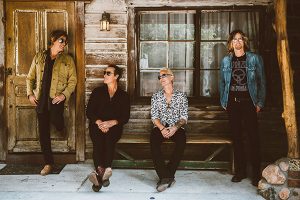
Photos Credit: Michelle Shiers
MPc: Right. I have to say, my first reaction when I heard your debut at the Troubadour show was almost astonishment, how well you maintained the songs identities without stepping on Scott’s legacy. Or Chester’s, for that matter.
JG: That was very important to me, that their legacy stay intact the way they are. And I’m here for the guys. To make sure they can continue their careers. It’s just so awesome that I get to be in Stone Temple Pilots, so I’m just trying to take all those things together and make the most out of the situation.
MPc: You walked in on that first day and immediately started writing together. “The Art of Letting Go” for example, I think it was the first song you all wrote together.
JG: Yes, that was one we did together. “The Art of Letting Go” was one we arranged together and it was the first one we actually sat through and just hashed out as a band. And I think they came away from that with a better understanding of who I was as a songwriter and an appreciation for what I could bring to the table. So that was kind of an important song for me. And I think that’s the one that really helped… I can’t speak to what their thoughts were, but in my own opinion, that was one where I felt like they realized what my capabilities were.
MPc: I think that’s terrific because, to me, “The Art of Letting Go” is a bit of a standout on the album. I think it really makes a statement that the magic was there from the word “Go.” I mean, all the tracks are great. It’s such a strong record. I don’t mean to digress… we were both in High School when they were dropping their biggest records, that’s an impactful time in life.
JG: Exactly.
MPc: I can only imagine what it feels like to be you right now.
JG: So weird. [laughs]
MPc: So the audition process, that was a little weird too. 15,000 online submissions narrowed down to 29, but you weren’t among any of those people. How did the audition come about?
JG: It happened a couple of ways, actually. I have a friend in New York who knows everybody and I just called him one day and said, “Hey, they ever find a singer?” He’s like, “I’ll check right now and I’ll send them your stuff.” So that was one way.
Another one was a friend of mine who [works with] The Hollywood Vampires. He actually told me he was going to go talk to Robert at the show and I’m, like, “Well, that’s cool.” I didn’t think anything would come from it, but… Yeah, so that’s how Robert heard me, was through him. So it was a bit of word-of-mouth too.
MPc: And when you—obviously, I don’t have to define X Factor for you. When you walked into that audition, and of course you bring these great vocals and you have your songwriting and you have your showmanship, but what else did you bring to that audition to help you stand out? What is your X Factor, so to speak?
JG: Well, I walked in thinking that I was the guy for the job. Just because I felt such a connection to Scott. I mean, like, we’re the same type of person, you know? And so it was—I was just trying to go in there, be myself, but I knew, I knew that I could do it. I knew I had the tools to do it if it all fell together correctly.
I was really at ease when I went in, I wasn’t nervous at all. It was like, this is me. And it worked out.
MPc: I saw Robert and Dean last night and when you say “At ease,” I have to say they kind of do put you at ease. Speaking to Robert, he’s quite the conversationalist; it was like I’d known him…
JG: They’re really, really nice guys. Don’t tell anyone I told you that, but they’re…
MPc: [laughs] Your secret’s safe with me.
JG: Good, good [laughs].
MPc: My readers may persecute me if I don’t ask about your vocal rig.
JG: Oof, those are things that I really don’t even worry about, ever. Those are usually things that are taken care of for me. I’m not a gearhead at all. I mean, I’ve recorded on some of the old Motown gear and that was just more nostalgia for me. But when it comes to new gear, it seems like there’s something new being made every other month, and it’s hard to keep up with all that stuff. I like to keep life simple… As long as it makes noise when I put it up to my face, I’m good. [laughs]
MPc: Right. And as long as you’ve got the bullhorn. You need the bullhorn.
JG: Yeah. [laughs]
MPc: So, clearly, this is your highest profile gig, but I know you’ve been doing this a long time. Like you said, you began on guitar and you were happy doing that. And songwriting. Then you became the singer. I’m familiar with and remember your band, Dry Cell, and I know you had lots of other projects…
JG: Dry Cell had a big record deal and that was a great learning experience for me, going through that process, learning how the business worked. But after Dry Cell I became a little disillusioned with the music industry as an industry—kind of felt like it lost its direction, and art, and what it’s all supposed to be about. So I kind of walked away. And then I found out I had a son, so it made (a little sense) to go back to it.
When I went back, I started a band called Band With No Name, and I was just very anti [industry]—it wasn’t meant to be put out on any labels or anything like that.
MPc: And now you’re back in the thick of it I’d say. How has your life changed since…? I mean, I know you moved to L.A., for example, but how else has your life changed since joining STP?
JG: It’s changed a lot just because I was doing other things before this came up and then life became all about this. And that’s a good thing. I have to be focused. I have to make sure I have all my T’s crossed and my I’s dotted. And make sure I walk in knowing what I’m doing and I’m always prepared. So it’s a very professional thing and they’re a legendary band, so for me to even be in the room, I have to work hard. I’m not afraid of doing that, so that’s pretty much all I do.
MPc: A labor of love. And yes, legendary. As a new member, do you feel the dynamic has changed now that you’re there and as a result of what they’ve endured? There’s an amazing new album and you’re going out on the road. Do you feel like there’s been a bit of a shift in mood or… I mean, they’ve been through so much loss…
JG: Yeah, well, I didn’t really know much of the situation when I first got into the band. I mean, Scott had passed. But I never really knew Scott, so it was like, I just let them have their own feelings about those things and I just tried to walk in and be myself and be my own person so that they can see how it can be with me. That’s pretty much all I focused on, just trying to… I try not to deal with any of the past because there’s nothing I can do about it. I wasn’t there, so I just try to make everything right from here on out.
I’m hopefully holding up my end of the bargain. [laughs]
MPc: Well, when discussing writing and recording this record, Dean was actually quoted as saying that having you was a “relief.” Do you think the process of putting out this album has been cathartic for them?
JG: Absolutely, absolutely. I could feel their energy at times and that was something I learned about–could even write about–here and there. But I would always relate things to my own life. I try to put myself in other people’s shoes. That’s where most of my songwriting comes from, compassion. I just tried to do that best I could, and hopefully it was a chance for them to get past some things that maybe they were trying to get past. And then we could move forward together, and everyone could participate in the future of Stone Temple Pilots.
Stone Temple Pilots (2018) is the band’s first album in eight years, and seventh since their 1992 debut. The self-titled release will be available everywhere albums are sold. On March 2nd, Stone Temple Pilots began their North American Tour.
For more information on STP and to find out when they’ll be in your area visit www.stonetemplepilots.com.
Feature Photo Courtesy Shannon Nicole

